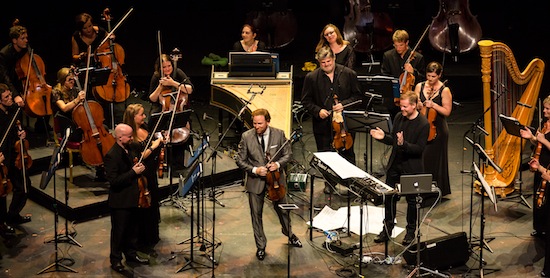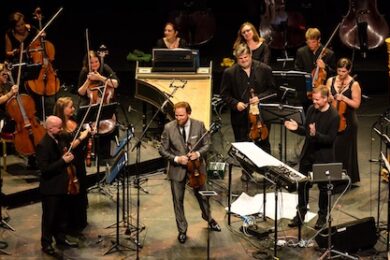Having seen countless orchestral concerts and Proms at the RAH over the years, you certainly wouldn’t blame Richter for feeling a little overawed at making his inaugural appearance on the venue’s famous stage. He and acclaimed lead violinist Daniel Hope exchange knowing glances as they wander out to the rapturous applause of a packed auditorium – with the Royal Philharmonic Concert Orchestra in tow – to play The Four Seasons Recomposed, Richter’s innovative re-imagining of Vivaldi’s masterpiece, to be followed by a tenth anniversary performance of his defining work The Blue Notebooks, first released in 2004.
A hugely familiar and omnipresent piece, The Four Seasons is not to be taken lightly. Richter has described how, after being repeatedly exposed to it (as a jingle in shopping malls, "on-hold" telephone muzak, TV adverts), he became "deaf to it as music." Using motifs and elements taken from the original, Recomposed is his attempt to reconnect with Vivaldi’s work and re-align it with the 21st century; subtle electronics and pulses assimilated into several of the movements plug into today’s "electronic universe", now such an integral part of our vast musical language.
Pulling apart Vivaldi’s colossal, instantly recognisable magnum opus on record is one thing, performing such an intricate and major work (albeit deconstructed) on a big stage quite another, but for a seasoned polymath like Richter, it’s all grist to the mill. Stationed on keyboards and electronics, he appears calm and unflustered, while Hope – standing stage-front, looking assured and dapper in a fitted silver suit, violin and bow grasped like trusty weapons – looks ready for battle.
And so it begins. The heavy, tangible sense of anticipation in the gallery gives way to an instant hush, as the brief dubby electronic prelude of ‘Spring 0’ fades up, before fusing with the shimmering swell of strings that make up ‘Spring I’. By ‘Spring II’, with the audience fully transfixed and still, Hope is already in the zone: eyes closed, upper body convulsing and bobbing, bow flaying against violin, teasing tricksy, piercing flourishes of sound from his instrument. You watch him like you would a practiced magician, hoping to see a chink or a flaw; how on Earth can someone play that fast and still retain such masterful coordination? Richter, in stark contrast, stands behind him, almost stock-still, a picture of immeasurable cool in regulation black jacket and t-shirt; his deft fingers skim the keyboard in front of him as he watches his wingman, sagely nodding along in approval.
Backed by the RPCO, the ‘seasons’ flit by in flurry after flurry of strings and electronic pulses. A chromatic wall of sound resonates through the cavernous space, and there’s a real sense of the physical landscape changing, from the intense, bright hues of summer to the creeping darkness of winter.
By deconstructing Vivaldi’s template, Richter really does mess with your head, and there are stellar moments here that grab you by the scruff of the neck: the rumbling ambient undercurrent of Summer II, propelled by a repetition of fragmented viola; the furious, relentless white knuckle ride of ‘Summer III’, with Hope lost in focus and concentration, his face creased up and distorted with the mighty effort of it all; the austere, vaguely nostalgic orchestral atmospherics of ‘Winter II’, feeling rather like you’re lost in the middle of a wintry scene, traipsing ecstatically through heavy snow. We’re treated to layer upon layer of exquisite depth; listening to this on vinyl, cocooned in your headphone world, is fantastic, of course, but there’s something about experiencing this on a live footing – sharing such cherished, detailed, reflective music with others, perhaps – that feels infinitely more rewarding.
The atmosphere is even more supercharged for the second half performance of The Blue Notebooks. With the stage configuration changed – Richter’s piano, keyboard and laptop, now stage left, are the focus – and the Max Richter Ensemble on violins, viola and cellos (in place of the RPCO), I’m sitting in a prime spot, just yards from the man himself. As the closest person to him in the entire auditorium, it’s a real privilege to witness the performance of Richter’s exquisite, intensely beautiful second album up close and intimate. A low-level, bluish-tinted light adds a lovely nocturnal feel; it feels almost as if they’re playing in my front room after dark to an audience of one.
Even as Richter’s hands gently trace the first few recognisable piano notes of the title track, the hairs on the back of your neck stand on end. And so it continues; as with much of the German-born composer’s work, The Blue Notebook‘s filmic compositions are rooted in widescreen desolation, gentle string surges and soft, pillowy electronic throbs. For an occasion as important as this, you half-expect Tilda Swinton to be here, reading extracts from Kafka and the poetry of Czeslaw Milosz (as per the original album), but it’s a moot point; her place is ably taken by actor and voice artist Sarah Sutcliffe, who also read for Memoryhouse, Richter’s haunting 2002 debut album.
As with the first half, there are countless standout moments: the hymnal resonance of ‘Organum’, laden with melancholy; the ecclesiastical, choral notes of ‘Iconography’, with its fugue-like organ; and the plangent electronic crackles and pops on ‘Arboretum’, heightened by forlorn but lustrous strains of violin. But it’s the all-consuming ‘Shadow Journal’, a slow, deliberate, string-led lament held together by an elemental synthetic pulse, that provides the giddiest, most immense rush of all. Poignant, reflective and hugely evocative, it’s almost impossible not to let such powerful music become a meditation on your own life; allow it to seep into your soul for long enough and it has the propensity to cut like a knife – little wonder that it lends itself so well to soundtracks (both ‘Shadow Journal’ and ‘Organum’ were used on Richter’s award-winning score for Waltz With Bashir). As well as the two landmark albums, there’s even time for a brace of tracks from 2010’s profoundly moving Infra album, too. It’s been a predictably momentous evening, a night on which classical music – the classical canon, even – was painstakingly subverted and reinvented. At the end of it all, Richter and co take their bow, looking distinctly and rightly pleased with themselves, as well they might after such a stirring, emotionally-charged performance.
"I cast a spell on the city, asking it to last," recites Sutcliffe (and Swinton before her on record) during ‘Shadow Journal’. That, in a nutshell, pretty much encapsulates the hypnotic mood and tone of Richter’s music, and its effect on tonight’s audience; rapt with pleasure and appreciation, they rise to their feet almost as one and erupt into loud, euphoric applause. You suspect that Vivaldi, being the maverick composer and virtuoso violinist he was, would heartily approve of it all, too.



